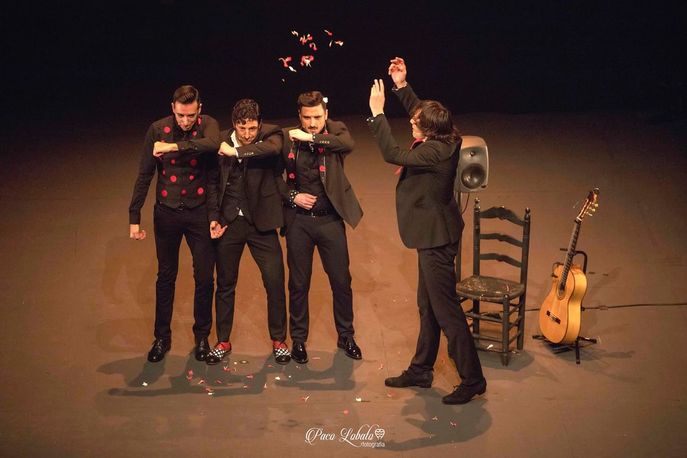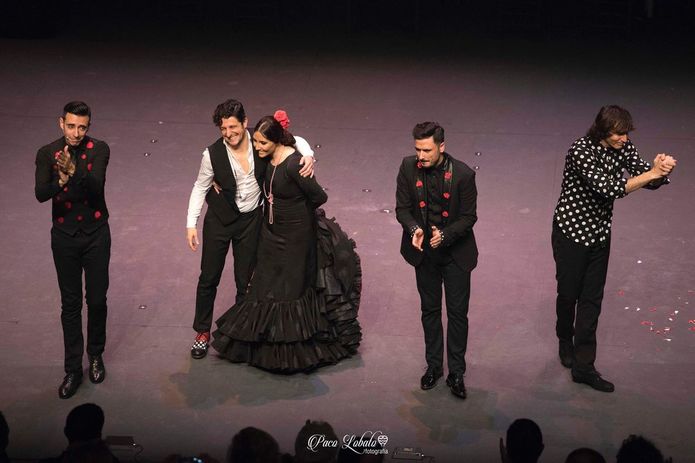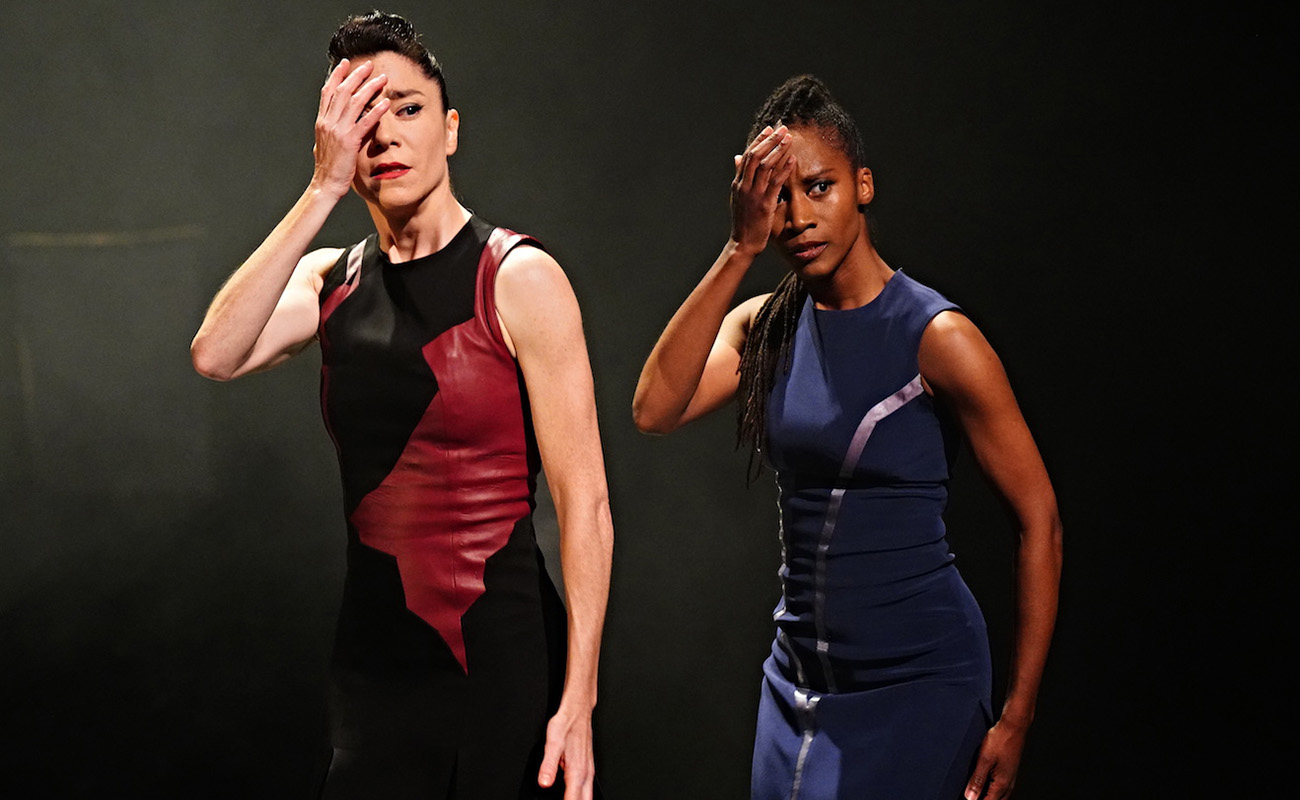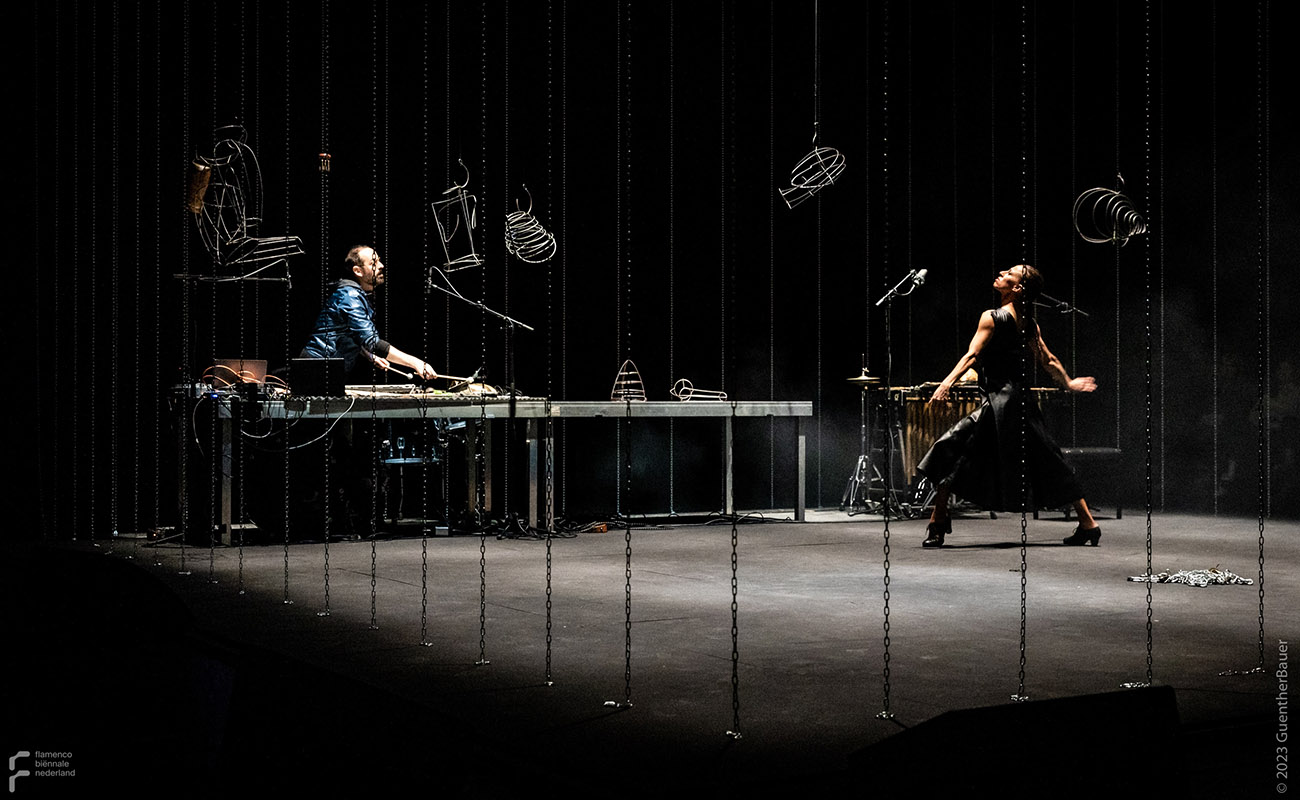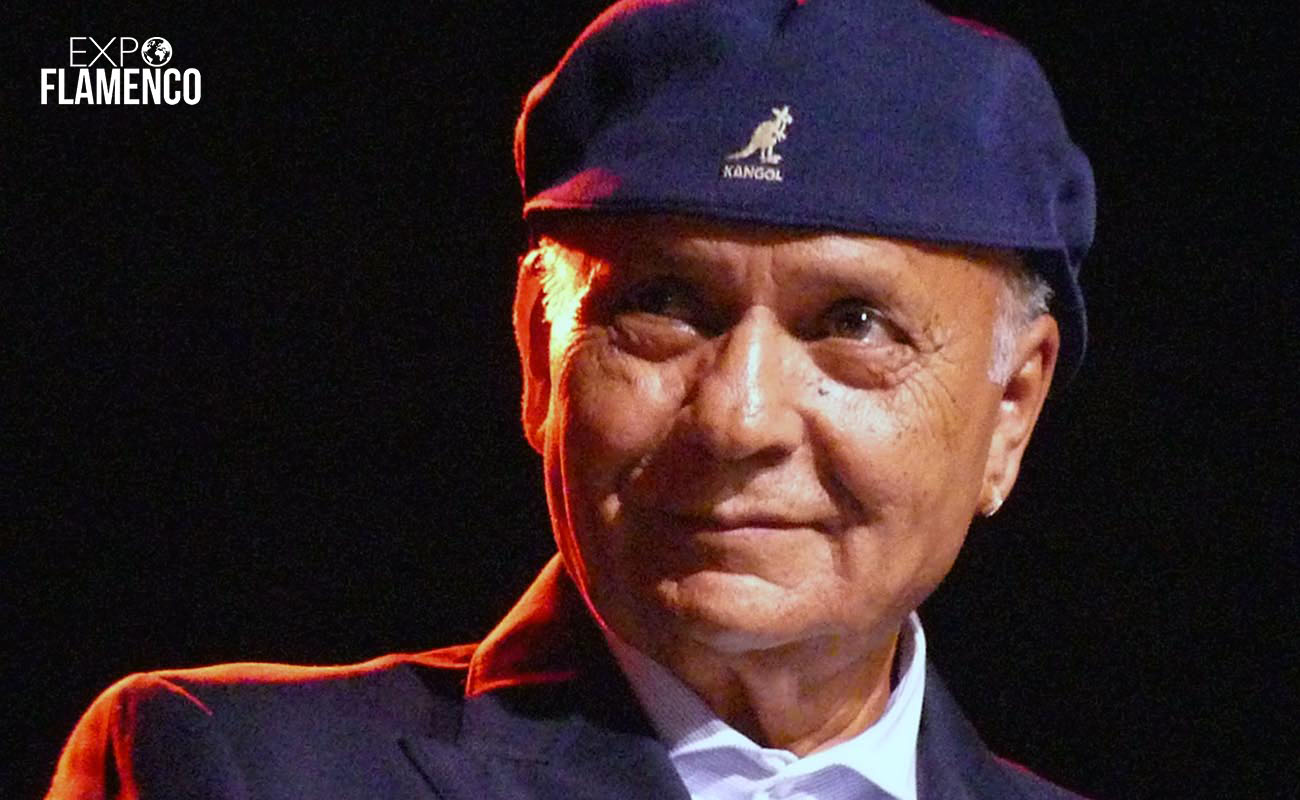Flamenco and laughter “a compás”
David Palomar, El Junco, Riki Rivera and Roberto Jaén brought their successful flamenco comedy to the Flamenco viene del Sur show seriesFlamenco viene del Sur
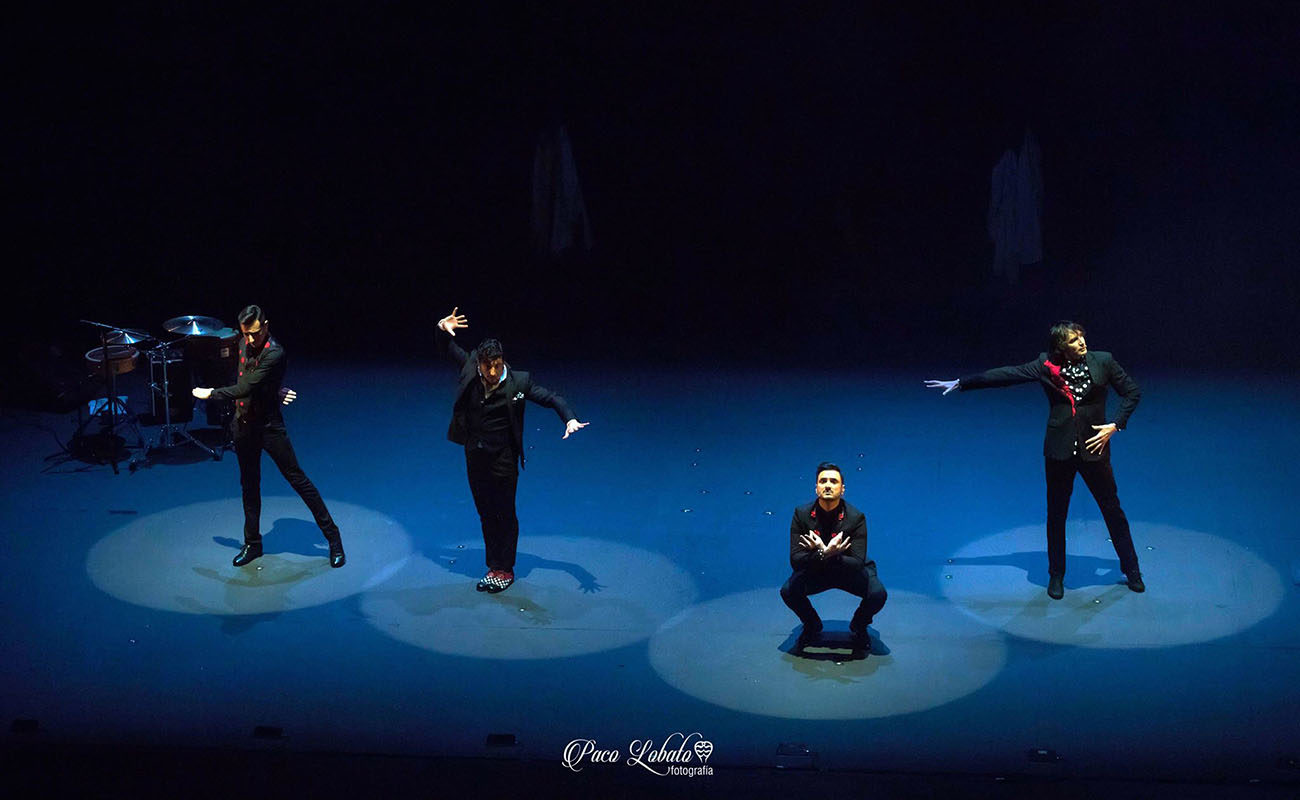
By Luis M. Pérez. Seville, March 14, 2018 (Photos by Paco Lobato)
How nice is tanguillo. Tanguillo is lots of fun. That’s the voice of David Palomar, who rehearses “Aquellos duros antiguos…” from the stage where the four artists are each surrounded by a circle of soft light on the floor. A litany of four different monologues start one after the other until becoming unintelligible. What a great angel, says David, and the four voices get mixed up once again in a great ruckus. Syria’s hell, refugees wandering aimlessly, senseless violence, the country’s corruption. “When I sing por seguiriyas, I can taste blood.”
They’re already telling us where this is all going, although not quite. The seguiriya makes its way among the confusion, with the compás, set by four pairs of hands and one pair of celestial feet, those of Juan José Jaén Arroyo El Junco (born in Cádiz in 1975), standing about 6 feet tall. Tall like his nickname, chin up, with dozens of whistles and sticks falling from his huge hands. El Junco’s hands seem infinite, they barely get above his head, he’s a bailaor with his own stamp. And yesterday he danced like never before. Palomar gets in tune, overflowing with wisdom as always, singing seguiriyas de Francisco la Perla acompasadas, while his brother in law, at the guitar, sounds brilliant and modern.
Ricardo Rivera Mora (born in Cádiz in 1979) starts his monologue while his three colleagues start reading the newspaper seating at the back, in Indian file, as if travelling on the subway. You know what? Riki is for sure the greatest artist of Cádiz, if not of all Andalusia. He is a comprehensive artist. Last night he performed like a fish in the water, making full use of his comic talent, speaking his monologue before the great Manu Sánchez, who was sitting on first row. An argument against laziness, apathy and boredom; in favor of hard work, perseverance, passion. Critics for half the critics, the other half are my guests. Critics also for the artists, who tear themselves apart at the slight evidence of a colleague’s success. All done hilariously, with the public cracking up with laugher and willing to be complicit.
After his monologue, a milonga comes out in David’s voice, and Riki takes us to the Caribbean with an instrumental guajira which earned an standing ovation from the audience. Impressive. That set the tone for the whole show. We are before a surrealist comedy, committed, nit-picky and with a clear academic intent. That was evident in El Junco’s monologue, full of wit. He’s not just a dancer, as he also sings well and has the gift of a speaker. Dr. Time interacted with the public, who could not stop laughing, while Juan José cured our lack of rhythm, an illness which will affect one hundred percent of world population by the year 2020, according to the University of La Caleta.
Then in was the turn of his brother Roberto Jaén (born in Cádiz in 1980), who blamed that illness on the new technologies, the new media sources and the fast pace of modern life. Roberto is a much better percussionist than actor, as you may know, yet he looked after the whole rhythmical frame of the show in a brilliant way, if I may say so. “If we told people that the brain is an app, perhaps people would start using it. Maybe if we could spend some time with the artists from the old days…”
Without missing a beat, they take a tin cup and start playing the Ouija to call upon the spirits. There you are. Speak! It’s Chano Lobato, speaking and singing through El Junco’s mouth. Roberto Jaén lends his throat to Juanito Valderrama, por guajiras and David Palomar imitates Camarón por bulerías, like no other, leaving us all with the chills. Before that, Susana Casas, a truly wonderful bailaora, did a great performance honoring Lola Flores, who complained that it’s always the same artists who perform in flamenco festivals.
It’s impossible to tell it all. David Palomar (born in Cádiz in 1977) is never below outstanding. He can both make a plea against flamenco purity as sing the most heartfelt soleares of the season. His own, those of Chozas de Jerez, those of Paquirri el Guanté, one, two, three. That was after the act of the duende, where he ridiculed the false theories and hypothesis of traditional flamenco. “I’ve never known hunger”, he says. “Tonight I want to sing por soleá for you, and all I can do is trying my best, with all my heart”. He did just that.
He also performed some very personal and catchy alegrías he brought from the East, which El Junco danced all over the stage until he got all the dust off it. “Dude, this guy can really dance”, some next to me said. “Such powerful feet!”. He dances in his own style, masculine, with lowered arms and the palms of his hands ironing every part of his shirt. David then sang por sevillanas (they gave plenty of ojana to the public, which didn’t mind one bit) and even sang the jota aragonesa. And he made us laugh. My stomach still hurts.
Event notes:
Show: Qué pasaría si pasara. Series: Flamenco viene del Sur
Place and date: Teatro Central de Sevilla. March 3, 2018
Cante: David Palomar
Baile: Juan José El Junco
Guitar: Riki Rivera
Percusión: Roberto Jaén
Invited artist in baile: Susana Casas
